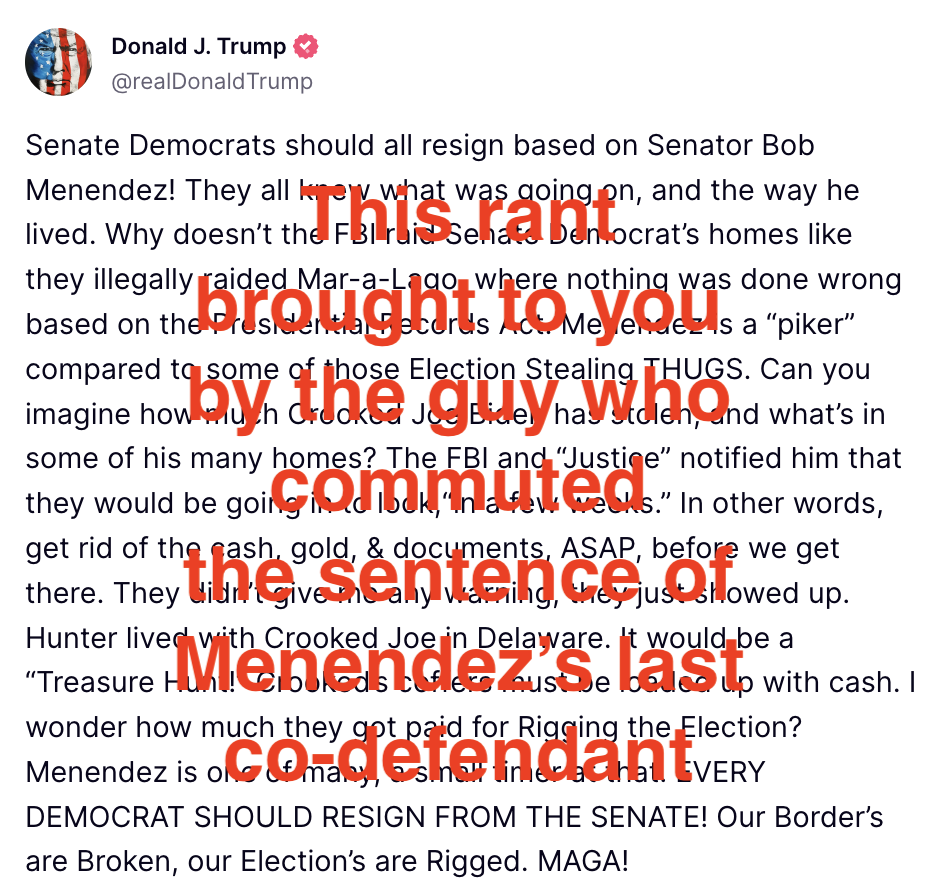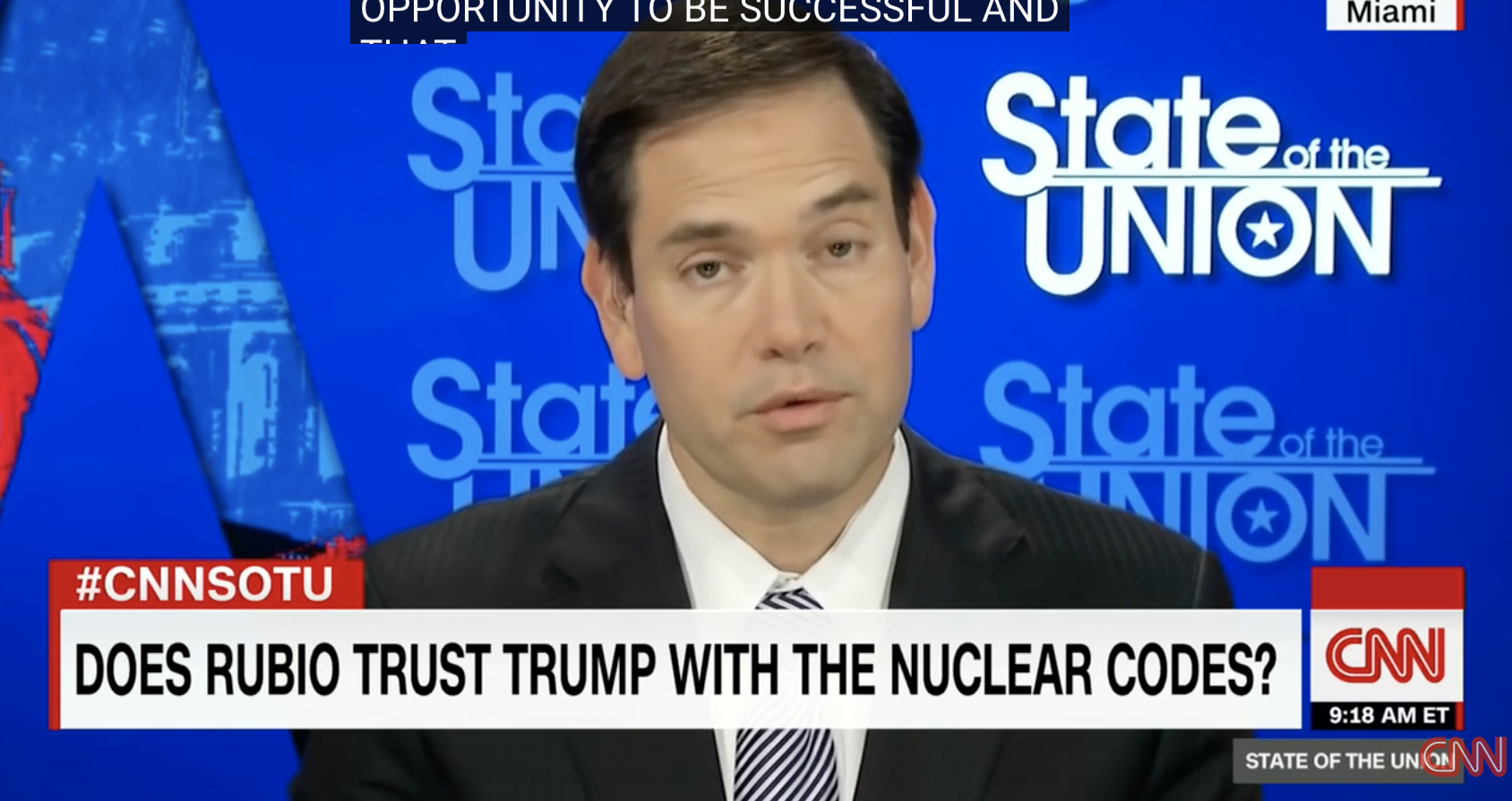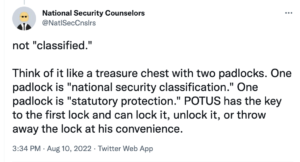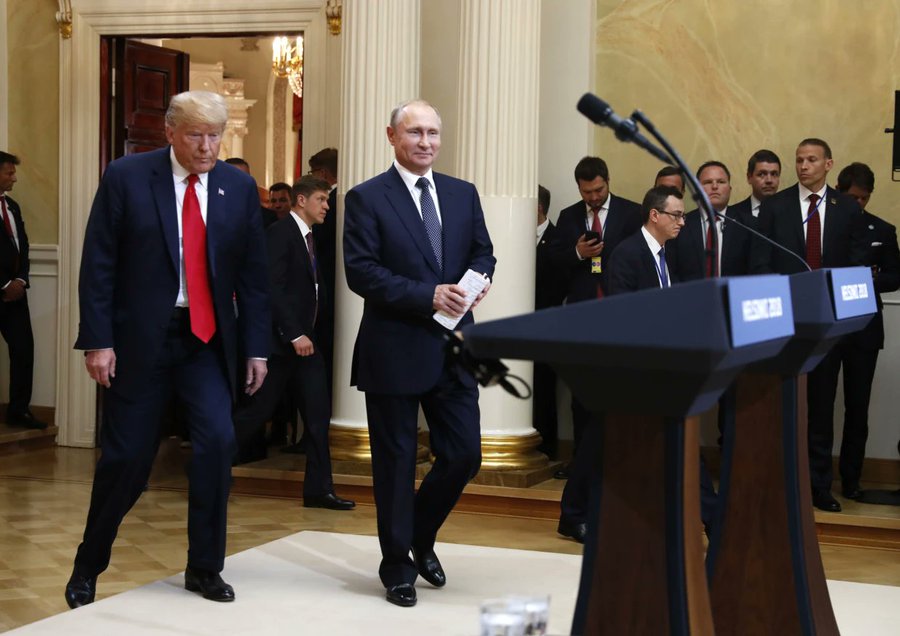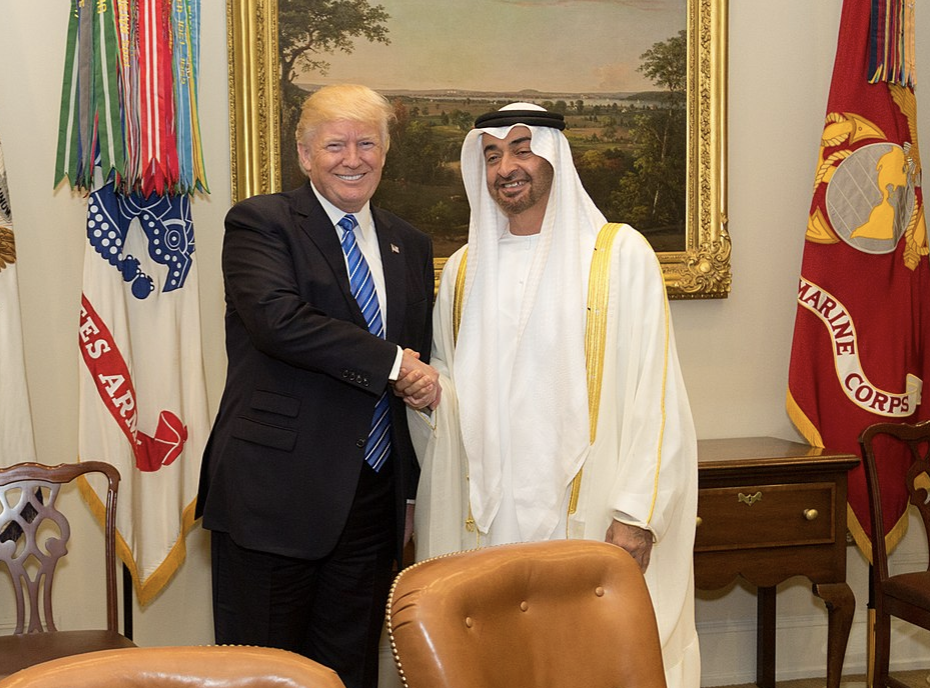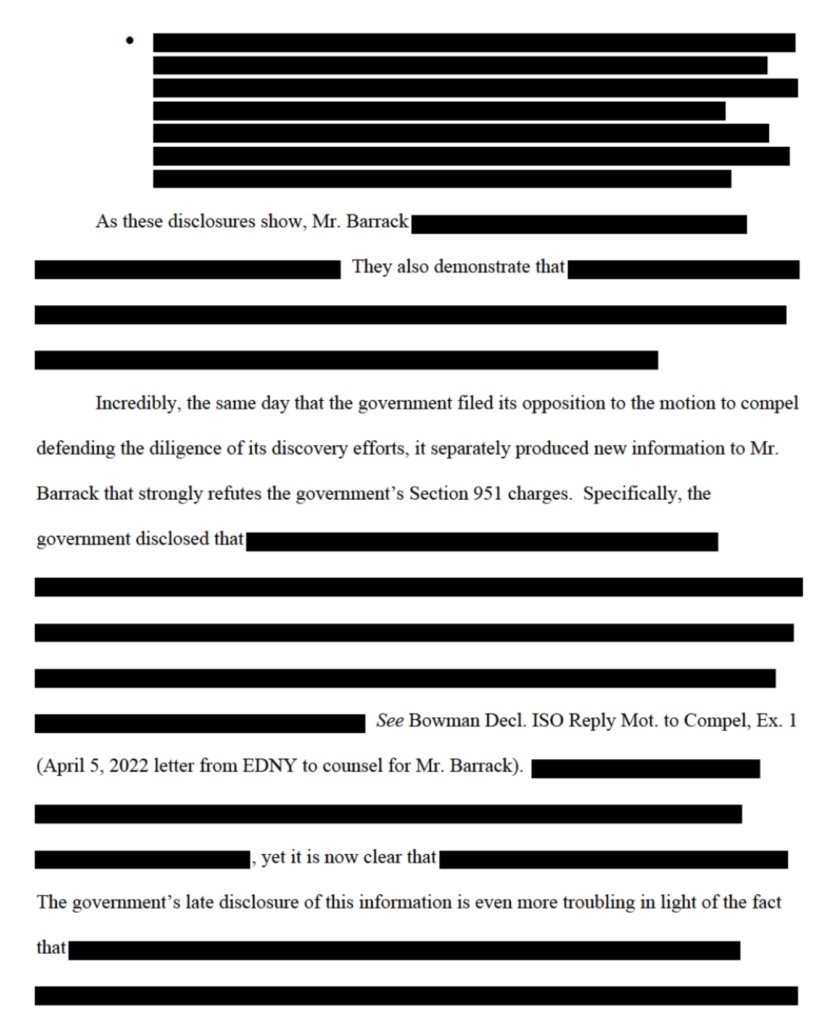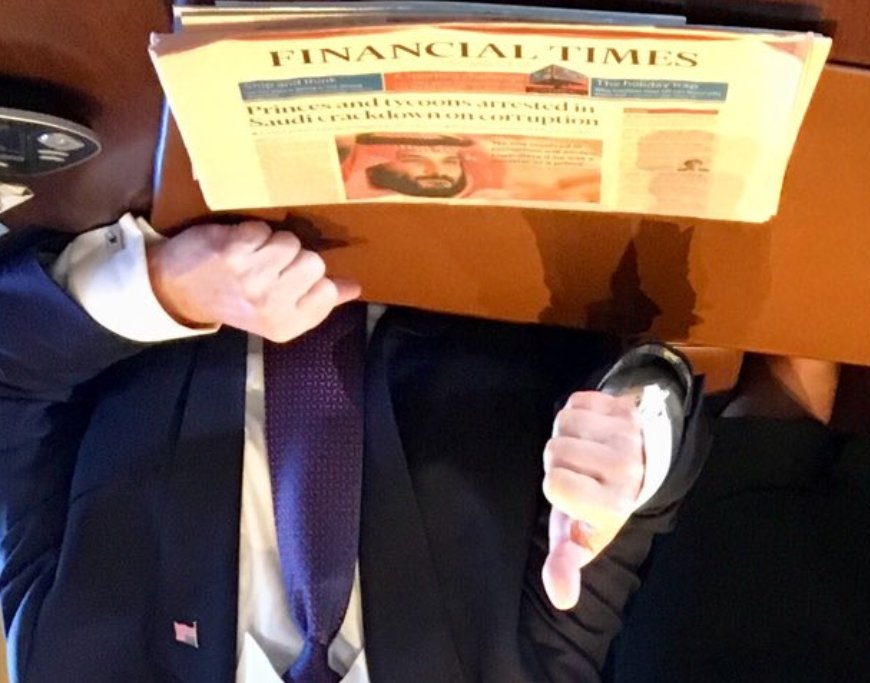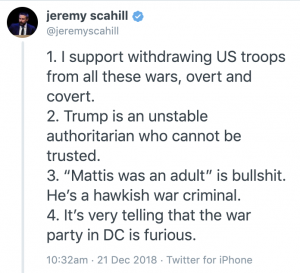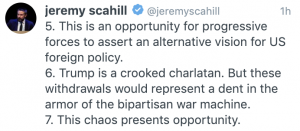“Piker:” Donald Trump Rants as if Robert Menendez’s 22 Ounces of Gold Were as Big as Jared’s $2 Billion
The former President went on one of his classic rants of projection last night, demanding that every Democratic Senator resign because of the alleged corruption of Robert Menendez.
“They all knew what was going on,” Trump said, “and the way [Menendez] lived.”
All Trump’s rants are, at their core, at least partly an attempt to use projection to cast attention away from his own similar or worse corruption.
This one is a doozy, though.
Start with the fact that Trump was suspected of getting $10 million from Egypt in September 2016, money he used to stay in the Presidential race. That suspected bribe was investigated for several years, with the Egyptian state-owned bank suspected of making the payment fighting a subpoena all the way to the Supreme Court. The investigation was then closed in summer 2020, without ever subpoenaing Trump Organization, during a period when Bill Barr was shutting down all Mueller-related investigations of Trump. The allegation that, like Menendez, Trump was on the take from Egypt — a key prong of the Mueller investigation — has been ignored by most outlets, so I may return to describe what we know of it.
Then consider that Trump told a comedian posing as Menendez, John Melenedez, that he believed Menendez had gotten a raw deal in his corruption prosecution. “Congratulations on everything,” Trump told the guy he thought was Menendez not long after DOJ dropped the first bribery prosecution. “We’re proud of you. Congratulations! Great job! You went through a tough, tough situation, and I don’t think a very fair situation. But congratulations!”
“They all knew what was going on, and the way [Menendez] lived,” Trump wailed. But so did Trump when he congratulated someone he thought was Menendez for getting away with accepting alleged bribes.
In fact, Trump even commuted the separate Medicare fraud sentence of Menendez’ first co-defendant, Salomon Melgen (like Menendez, the jury hung on bribery charges against Melgen). When Trump claims that Senate Democrats knew what was going on? Unlike Senate Democrats, Trump reviewed Melgen’s conduct closely enough to save him from most of a 204-month prison sentence. Trump specifically said that “the ends of justice do not require [Melgen] to remain confined until his currently projected release date of August 2, 2031.” There’s no question Trump doesn’t care about Menendez’ corruption because he used his presidential authority to eliminate most punishment against Menendez’ co-defendant.
Finally, the craziest part of Trump’s attempt to project his own corruption on Democrats: a key allegation in the Menendez indictment alleges that Menendez did exactly what Jared Kushner did, only for a tiny fraction of the payoff that Jared got.
As I noted in this post, most of Menendez’ Egypt-related corruption came before he and Nadine were married, and most of the payment was laundered through Wael Hana’s halal company, at which Nadine had a no-work job. That may make it hard to prove was a quid pro quo.
There’s one glaring exception to that: The 22 one-ounce bars of gold that, the indictment suggests, Menendez and Nadine received days after Menendez helped shield Egypt from repercussions tied to their role in the Jamal Khashoggi execution.
As the indictment explains, after Nadine’s relationship with Egyptian Official-4 had blossomed over time, the two of them set up a meeting between Menendez and a senior Egyptian intelligence official on June 21, 2021, before the same official would meet with other Senators.
On or about June 21, 2021, NADINE MENENDEZ and Egyptian Official-4 organized a private meeting between MENENDEZ and a senior Egyptian intelligence official (“Egyptian Official-5”) in a hotel in Washington, D.C. prior to a meeting between Egyptian Official-5 and other U.S. Senators the next day. On the day of the private meeting, MENENDEZ provided NADINE MENENDEZ with a copy of a news article reporting on questions that other U.S. Senators intended to ask Egyptian Official-5 regarding a human rights issue. NADINE MENENDEZ then sent that article to Egyptian Official-4, who responded, “Thanks you so much, chairman [i.e., MENENDEZ, the Chairman of the SFRC] also raised it today, we appreciate it.” The next day, NADINE MENENDEZ texted Egyptian Official-4 that she hoped the article she had sent was helpful, and stated, “I just thought it would be better to know ahead of time what is being talked about and this way you can prepare your rebuttals.”
A Michael Isiskoff story posted the same day explained what Egypt would need to “rebut:” Egypt’s Intelligence head, Abbas Kamel, was set to be grilled about Egypt’s role — providing training and drugs — in the execution of Jamal Khashoggi.
A just-released Yahoo News “Conspiracyland” podcast series about Khashoggi’s murder [] revealed that the Gulfstream jet carrying a so-called Tiger Team of Saudi assassins to Istanbul made a middle-of-the-night stopover in Cairo for the purpose of picking up a lethal dose of undetermined “illegal” narcotics.
The drugs were injected hours later by a Saudi Ministry of Interior doctor into Khashoggi’s left arm inside the Saudi Consulate in Istanbul — an operation that the CIA has concluded was authorized by Saudi Crown Prince Mohammed bin Salman, often known as MBS.
Abbas Kamel, the chief of Egyptian intelligence, is visiting Washington this week to meet with U.S. intelligence officials as well as members of the Senate Foreign Relations Committee. Staffers told Yahoo News that a number of senators are preparing to ask Kamel about the Cairo stopover — the subject of a Washington Post editorial on Sunday — and whether Egyptian intelligence officials delivered or helped facilitate the delivery of the drugs.
[snip]
There is also evidence that Egyptian intelligence may have provided training for the Tiger Team as well as previous support for Saudi abductions ordered by MBS. A Saudi source familiar with the matter told Yahoo News that the Egyptians assisted the Tiger Team with the 2015 abduction from Italy of Saudi Prince Saud bin Saif al-Nasr. An outspoken foe of MBS, the prince was tricked into boarding a plane he thought was flying to Rome but ended up in Riyadh. He has not been heard from since.
The indictment implies that whatever Menendez did to blunt the accusations of his fellow Senators, it had some tie to the 22 ounces of gold that Hana purchased two days later, at least some bars of which were found at the Menendez residence when it was searched a year later.
On or about June 23, 2021—i.e., two days after the private meeting between MENENDEZ and Egyptian Official-5—HANA purchased 22 one-ounce gold bars, each with a unique serial number. Two of these one-ounce gold bars were subsequently found during the court-authorized search in June 2022 of the residence of MENENDEZ and NADINE MENENDEZ. During the relevant time periods, the spot market price of gold was approximately $1,800 per ounce.
In his rant, Trump accused Menendez of being “piker” compared to others, but he got the comparison wrong.
After all, Menendez sold out cheap. If he received all 22 of those gold bars in 2021 in recognition of having laundered the reputation of Egypt, it would have been worth roughly $40,000.
That’s a miniscule amount compared to what Jared got — $2 billion — for whitewashing Saudi’s role in the Khashoggi execution.
Trump, who knows better than Senate Democrats what was going on, is right: Menendez was a piker. But he was a piker when you measure him against the corruption of Trump’s own son-in-law.

